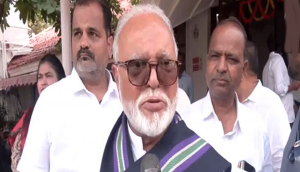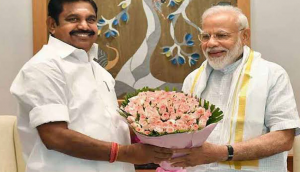Tune in: the SC is about to decide whether Indians have a right to privacy

The argument
- Indians don\'t have a right to privacy, says AG Mukul Rohatgi
- He\'s defending the constitutional validity of Aadhaar
- Aadhaar, he says, can\'t be rolled back; it has cost Rs 5,000 crore
- 8.19 crore people have been enrolled so far
- The matter will now be decided by a constitutional bench
Counter Argument
- Right to privacy is covered by Articles 19 and 21
- These deal with the right to life and liberty, freedom of speech
- And Aadhaar violates this right, argue criticsIt puts personal data in the hands of the state and private firms
- And without legal protection, the data could be misused
More in the story
- The UPA projects without legislative sanction that NDA has continued
- Is the privacy argument just a ruse to delay the Aadhaar case?
- If the SC scraps Aadhaar, what happens to the biometric data collected?
On 22 July, Attorney General Mukul Rohatgi threw a shocker at the Supreme Court. While defending the constitutional validity of the Aadhaar, he said Indians don't have a fundamental right to privacy.In a nutshell, this is what the Centre argued: there is no court judgment that explicitly cites the right to privacy as a fundamental right.
Article 21 - which enshrines the fundamental right to freedom - doesn't spell it out either. Rohtagi's argument was that if the court wanted more clarity on the subject, only a Constitution Bench could decide on the issue.
On 11 August, the Supreme Court agreed to the Centre's plea that the case be heard by a constitutional bench. This will push the the judiciary to decide whether the right to privacy exists in democratic India.
However, the apex court has also issued an interim order reiterating its previous judgement that the government can use Aadhaar for certain Public Distribution Schemes but possession of the card will not be a condition for according benefits.
The Court also asked the government to widely advertise in print and electronic media that Aadhar subscription is not mandatory for citizens.
Redirecting the debate
Mukul Rohatgi had argued that an eight-judge bench of the court had ruled in 1954 that privacy was not a fundamental right but the judgment was diluted by smaller-bench verdicts in the 1990s.
To settle these divergent views, Rohatgi said, the court should constitute a larger bench. The case was being heard by a bench of justices J Chelameswar, S A Bobde and C Nagappan.
So far, over 8.19 crore people have enrolled for UID Aadhaar. And it has cost Rs 5,000 crore
The contention not only confounds the basis on which the case is being fought, but raises serious constitutional questions.
India's Constitution, indeed, does not spell out the right to privacy as such. But over the years, the courts have upheld the right to a dignified life, and hence to privacy under Article 21 and other statues that outline the right to life and liberty and other freedoms that underpin the idea of the nation. These rights are fundamental and indispensable, though subject to "reasonable restrictions".
The Court has agreed to set up a constitutional bench to clarify the contours of the Right to Privacy in India.
The Aadhaar debate
The issue of privacy is central to the debate over the legality of the UID Aadhaar scheme. Its critics, many of whom have petitioned the apex court, have laid out the following arguments:
Biometric data collected for Aadhaar - fingerprints, iris scans - can easily be misused, including by law enforcement agencies, since there's no specific law to seal it.
The UPA government pushed the scheme through an executive order, without giving it legislative backing, and the NDA government too doesn't plan to work out a foolproof legislative framework for it.
Indeed, the NDA has continued several projects of the previous regime which are operating without protective law and parliamentary scrutiny - the National Intelligence Grid or Natgrid, Central Monitoring System, Internet Spy System Network and Traffic Analysis System or NETRA, Crime and Criminal Tracking Network and Systems.
Currently, the DNA Profiling Bill, which may result in a database of sensitive personal data with little to prevent its misuse, is being tabled in Parliament.
The only attempt to give Aadhaar legislative sanction came five years ago, when the UPA introduced the National Identification Authority of India Bill, 2010. It was referred to a Select Committee of the Parliament, which rejected it.
The committee said the bill had serious flaws and didn't have safeguards against invasion of privacy. The government then bulldozed the scheme through with an executive order.
The massive exercise of identification for Aadhaar was sub-let to a host of private companies, national and international. Giving them access to the personal data of millions of citizens without a law to ensure it's not misused poses an alarming threat to privacy.
"Unlike the census or other such government exercises, Aadhaar data collection was privatised. The government claims the data is secure with it. But the key is collection and management of the data," says Ravi Sundaran, Fellow, Centre for the Study of Developing Societies.
"Then, there's the mandatory element of it. The government makes it essentially compulsory to have an Aadhaar card without saying it's compulsory. And not just for welfare programmes but private things like opening of bank accounts," Sundaran adds.
"If Aadhaar is set up as the necessary filter to enter all crucial domains of life, economic or otherwise, then it poses a challenge to what we are as people. It harms our basic rights.
In 2010, a parliamentary committee rejected the UID but it was implemented through an executive order
Even though the Court has laid safeguards to minimise the possible damages done by Aadhar, how will the courts keep vigil at the behemothical exercise that the UID project is? Previously too the Courts took objection to the fact that the government was harbouring the illusion in the public that Aadhar cards were a mandatory step towards many essential services provided by the government - including the right to vote.
Shyam Divan, who was arguing against Rohatgi, told the Court that "nowhere in the Aadhaar scheme is the word 'biometrics' used. Yet, iris scans are being done in the camps. Even the enrollment form does not use the word 'bio-metrics'. So, now there is a huge collection of citizens' personal data... there is something wrong here, egregiously wrong.
Welcoming the move by the SC while raising serious concerns on the intent of the government Chinmayi Arun, Research Director, CCS, NLU Delhi states "the discussion on privacy in India is a much needed one. The public gets worked up about censorship but privacy is the bigger demand as the damage to privacy is seen only after it's done.
What happens with the actual implementation around Aadhar depends on the good faith of the government and the constant vigilance of the SC. We are all waiting to see how this unfolds."
Keeping a check
Some of these fears were put to rest when the Supreme Court, on 23 September 2013, ruled that Aadhaar can't be made mandatory for accessing social welfare schemes. It can, at best, be voluntary. The order had come on a PIL filed by retired Justice K S Puttaswamy, but it wasn't implemented in a fair spirit. The government's intent of pushing Aadhar at any cost is clear by the AG's arguments in the court.
Till then and even now, the common impression is that Aadhaar was necessary to avail social welfare schemes. This led to huge enrolment in the initial months, especially in rural India.
So far, over 8.19 crore people have enrolled for UID, considered the world's largest national identification project.
The government had wanted to create an overarching, centralised identification for all citizens, but the September 2013 order threw a spanner in the plan.
With a batch of fresh petitions, the issue again came to a boil.
Responding to a batch of petitions, the apex court took exception to the fact that despite its ruling, states were insisting on the Aadhaar to disburse social welfare benefits.
It was then that Rohatgi turned the argument around to privacy. His motivation though may have been less grand than constitutional quandary: by pointing the court towards the privacy puzzle, he has made sure that the Aadhaar case is pushed down the priority list.
Justice delayed?
The SC today has issued an interim order directing the government to publish on electronic forms that enrollment in Aadhar scheme is by no means mandatory, making it very clear that the production of the Aadhar card cannot be made compulsory for essential services.
With respect to the sharing of personal information, the Court has ordered a strict non-disclosure of information unless the information is sought through a court order for the purpose of a criminal investigation. The card is not to be used for any purpose except to obtain food grains and kerosene.
But the irony remains that the Supreme Court has given the same order thrice on the same matter and each time, it has found that the states are in blatant violation of the order. Senior advocate Gopal Subramaniam had raised the question of contempt of court in the matter.
Even though an interim order has been passed, the shifting of the spotlight on the 'privacy' debate has lead to two things. It has opened up the very crucial debate on the constitutionality of privacy in an ever-vulnerable time of cyber crimes and surveillance while also pushing the case of UID down to an indefinite limit.
Some argue that even though it really depends on the will of the CJI to constitute a bench on the matter, it might take a long time, given the backlog of cases, to set up a Constitutional bench to consider the question of the right to privacy.
Rohatgi has, thus, bought the government more time to substantiate its standing in the court.
"The objective was to get the case heard by a larger bench. Constituting a special bench of nine judges would mean that effectively half the court is hearing just one case, blocking all others.
Logistically, this won't be possible immediately," explains Advocate Apar Gupta.
"Considering the legal points in play, I think it's a disingenuous argument that the court has not recognised the right to privacy. I think that's been done quite clearly," Gupta adds.
Nevertheless, it will likely distract the court from the real matter at hand, and postpone the case indefinitely. So, by the time there is a clear judgment of the Aadhar matter, Aadhaar enrolment would have crossed 10 crore people or more, at a considerable cost to the public, of course.
Already, Rohatgi has argued that it's too late to roll back the project as Rs 5,000 crore has been spent on it and that the balance of probabilities have shifted in favour of the government since ninety one per cent of the adult population has already been enrolled in the scheme.
Soli Sorabjee, underlined the lack of a statutory system monitoring the UID scheme. He also remarked "there are eight million people who have enrolled that are not to be found in the Aadhar database
While we await the court's decision on whether we have a right to privacy, it's quite possible that it won't be say for the court to dismantle the massive Aadhar project as it will amount to wasting enormous public resources and effort. If the court however scraps the UID, the government will likely have to seal or destroy the personal data of millions of citizens.
But the nature of privacy is such that once lost, it can't be regained.
First published: 12 August 2015, 12:09 IST






![BJP's Kapil Mishra recreates Shankar Mahadevan’s ‘Breathless’ song to highlight Delhi pollution [WATCH] BJP's Kapil Mishra recreates Shankar Mahadevan’s ‘Breathless’ song to highlight Delhi pollution [WATCH]](https://images.catchnews.com/upload/2022/11/03/kapil-mishra_240884_300x172.png)

![Anupam Kher shares pictures of his toned body on 67th birthday [MUST SEE] Anupam Kher shares pictures of his toned body on 67th birthday [MUST SEE]](https://images.catchnews.com/upload/2022/03/07/Anupam_kher_231145_300x172.jpg)






